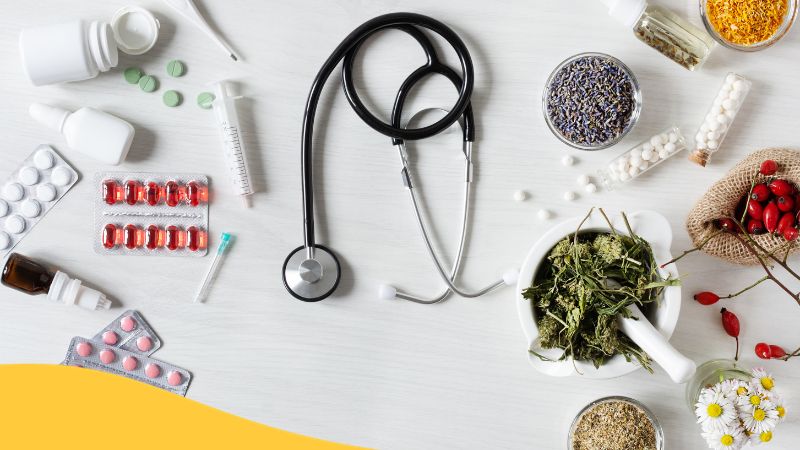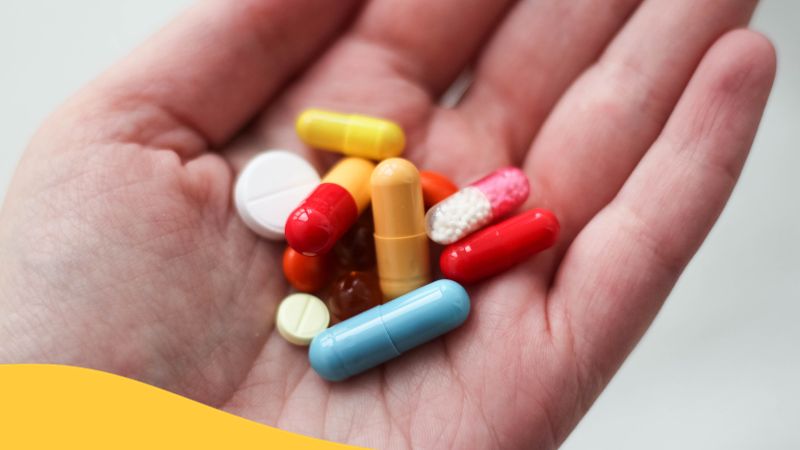Medical scenarios can be stressful and confusing, more so in a foreign land. Knowing the basic medical terminology could be a lifesaver and can smoothen your interaction with healthcare professionals. Perhaps you’re keen on learning Korean words for medicine due to your profession. Or you could be a linguistics enthusiast who just loves to dive deep into a new dialect. Regardless of your motivation, we are here to guide you through a brief yet comprehensive introduction to this niche within the Korean language.
In this blog post, we will delve into some primary Korean words related to medicine. We will navigate through general medical phrases, cover some important terms related to medical conditions, treatment, and procedures, and finally, help you with some directional words essential within a hospital. Our aim is to help you decode the realm of Korean medical terms and equip you for any health-related conversations you might need to lead in Korean.
What Is “Medicine” In Korean?
In any language, one fundamental step to engage in a subject is understanding the core terms related to it. When it comes to health and medicine, the term that catches your immediate attention is, indeed, “medicine.” So let’s delve deeper into what we mean when we say “medicine” in the Korean linguistic context.
The general translation for the term “medicine” in Korean is 약 (Yak). This term is widely used and understood in Korea. However, Korean, like many languages, offers a panorama of synonyms and related terms that capture the concept of medicine under different lights and contexts. Here are some of the synonyms according to the locals:
- 의학 (Uihak): This term corresponds more directly to “medical science” as a discipline. It encompasses the broad spectrum of knowledge related to diseases and the human body. It signifies medicine as an academic and scholarly field rather than a tangible counterpart like a pill or syrup. In academic and formal settings, you’re more likely to hear this term.
- 약물 (Yakmul): A broader term used to denote “medicinal substances,” “yakmul” is typically brought up when discussing the chemical components or active ingredients in a medication. Its usage is relatively frequent in scientific contexts, particularly in pharmacy or medicinal discussions where an understanding of the substance being used for treating a medical condition is necessary.
- 처방약 (Cheobang-yak): This directly translates to “prescription medicine,” where “처방” means a prescription, and “약” denotes medicine. It implies that certain medications are only accessible with a doctor’s prescription. It’s a term you might encounter in hospitals, clinics, or pharmacies when specific, potent drugs are being discussed, prescribed, or dispensed.

Korean Words For Medicines
As we navigate further into the realm of Korean medical terminology, it becomes crucial to familiarize ourselves with the Korean names for common types of medicine. These terms can be invaluable when you need to purchase medicine in a Korean pharmacy, or “약국” (Yakguk). Let’s take a look at these common medicine types and their Korean translations.
| English | Korean Script | Korean Pronunciation |
|---|---|---|
| Aspirin | 아스피린 | Aseupirin |
| Antibiotics | 항생제 | Hangsaengje |
| Painkiller | 진통제 | Jintongje |
| Vitamin | 비타민 | Bitamin |
| Cough syrup | 기침약 | Gichimyak |
| Antacid | 위산중화제 | Wisanjunghwaje |
| Insulin | 인슐린 | Insyullin |
| Antihistamine | 항히스타민제 | Hanghistaminje |
| Vaccine | 백신 | Baegsin |
| Eye drops | 안약 | Anyak |
Knowing these words could be a real lifesaver if you’re in a medical situation where you need to buy medicine or explain your medication history. Remember, when purchasing medications in Korea, especially antibiotics, it’s essential to have a proper prescription from a local doctor.

Korean Words For Medical Treatment And Procedures
Medical treatment and procedures are an integral aspect of healthcare provision. Familiarizing yourself with the Korean terms for various treatments and procedures can enhance your understanding and communication in a Korean medical environment. It equips you to better explain your symptoms, grasp information about your diagnosis, and follow any treatment plans. Here are some crucial terms for medical treatment and procedures in Korean:
| English | Korean Script | Korean Pronunciation |
|---|---|---|
| Surgery | 수술 | Susul |
| Prescription | 처방전 | Cheobangjeon |
| Injection | 주사 | Jusa |
| Anesthesia | 마취 | Machwi |
| Diagnosis | 진단 | Jindan |
| Physical Therapy | 물리 치료 | Mulli chilyo |
| Dental Cleaning | 치아 세척 | Chi-a secheuk |
| Blood Test | 혈액 검사 | Hyeol-aek geomsa |
| X-ray | 엑스레이 | Ekseurei |
| MRI (Magnetic Resonance Imaging) | 자기 공명 영상 검사 | Jagi gongmyeong yeongsang geomsa |
| CT Scan (Computed Tomography Scan) | 컴퓨터 단층 촬영 | Keompyuteo dancheung chwalyeong |
| Ultrasound | 초음파 검사 | Choeum-pa geomsa |
| Radiation Therapy | 방사선 치료 | Bangsaseon chilyo |
| Chemotherapy | 항암 치료 | Hang-am chilyo |

How To Purchase Medicine In Korean
Purchasing medicine in a foreign country can be quite confusing due to language barriers and different regulations from what you might be accustomed to. In Korea, you can buy over-the-counter drugs and prescribed medications at a pharmacy, which is called “약국” (Yakguk) in Korean. Here is a step-by-step guide on how to purchase medicine in Korea.
Step 1: Locating A Pharmacy
Pharmacy stores, or 약국 (Yakguk), are widespread in Korea. These are signified by a distinctive green cross or signboard.
Step 2: Communicating With The Pharmacist
Here are a few phrases that might help you communicate effectively:
- 으 어떤 약이 필요해요? (Eu eoddeon yak-i pilyohaeyo?): I need some medicine.
- 이 처방전에 나와 있는 약을 주세요. (I cheobangjeon-e nawa issneun yag-eul juseyo.): Please give me the medicine listed in this prescription.
- 이 약의 부작용은 무엇인가요? (I yag-ui bujag-yong-eun mueos-ingayo?): What are the side effects of this medicine?
- 이 약 가격은 얼마인가요? (I yak gageog-eun eolma-ingayo?): How much does this medicine cost?
Step 3: Understanding The Instructions
Before leaving the pharmacy, ensure that you understand the instructions for using the medicine. Here’s a helpful translation:
- 하루에 몇 번을 복용해야 합니까? (Haru-e myeot beon-eul bogyonghaeya hapnikka?): How many times a day should I take this medicine?
Step 4: Payment
In Korea, you could pay with cash, card, or even via your phone. Just say, “카드로 결제할게요” (Kadeulo gyeolje halgeyo) to pay with a card or “현금으로 결제할게요” (Hyeon-geum-eulo gyeolje halgeyo) to pay in cash.
Over To You
purchasing medicine in Korea doesn’t have to be challenging once you know the essential Korean medical terms and phrases. From learning to locate a pharmacy (약국), to asking for medication (약), or even explaining your symptoms (증상), this guide should provide you with the necessary understanding.
Remember, in case of an emergency, knowing the nearest hospital (병원) or emergency room (응급실) could be a life-saving piece of information. Also, if you have health insurance, it is always a good idea to have the details on hand, as it could matter in the event of an illness or injury.
And for the fans of Korean dramas, you may have noticed words related to health or medical terms frequently popping up in shows like “Hospital Playlist.” Terms like “doctor” (선생님 or 의사), prescription (처방전), high blood pressure (고혈압), even common cold (감기) and more can be heard, which can enhance your learning experience.
Learn The Korean Language With Ling
For those serious about learning the Korean language beyond these basics, incorporating it into your daily life can be very useful. Whether you are passionate about Korean cuisine, enjoy watching Korean dramas, or are practicing speaking Korean words with friends, these experiences contribute to your language proficiency.
One tool that can help you is the Ling app, available on both the App Store and the Play Store. The Ling app offers a wide range of Korean vocabulary and phrases, making learning Korean as simple and fun as possible. This can be particularly beneficial for health-related terms, which are essential for daily life and in emergency scenarios.
Give Ling a try now!



































































